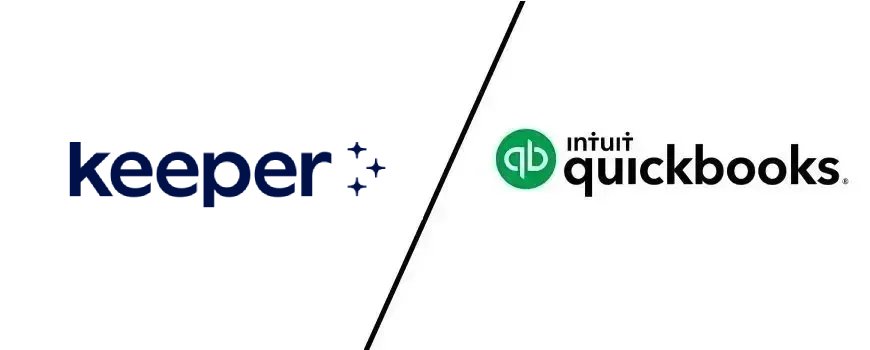
Keeper Tax is a self expense tracking software. It is primarily used by freelancers, small- business, etc. However, it possesses a series of features that do not QuickBooks have not included. QuickBooks also has a similar kind of freelancing program known as QuickBooks self-employed. Nevertheless, it still does not include premium features like Keeper Tax.
Keeper Tax vs QuickBooks: Intro
Keeper Tax
It is created for freelancers to perform automated tax-saving activities. It detects the write-offs among the user’s purchases and aids them in making maximum savings. At first, Keeper-tax thoroughly overviewed the purchases. The user can then file tax via the Keeper-tax and export savings. Subsequently, the user will now be monitored by a professional bookkeeper. It categorizes the work purchases including that of the previous years. The software tax experts may contact the user if they find any discrepancy while reviewing the purchase. If the user cannot provide the receipt, the software can read the bank statement. When any subscriber makes a cash purchase after registering with the application, he can send a picture to the Keeper tax professional for automatically categorizing it.
QuickBooks
QuickBooks is an accounting program. It is created for the small-sized businesses to give them cloud-based experiences and on-premises accounting. The software has a user-friendly interface. With few clicks you can create invoices and get cash flow. It is a comprehensive solution for any business offering a range of services from managing fixed assets to account payable and receivable.
Keeper Tax vs QuickBooks: Features

| Keeper Tax | QuickBooks |
| It deals with bookkeeping | While using QuickBooks, you can customize the transaction reports |
| The user can easily track their expenses and write it off to save money | You can also create new invoices besides keeping a track of old invoices |
| The software is used for saving taxes | As you become a QuickBooks user, you do not have to do additional data entry tasks. The online banking connect feature auto-updates the record book |
Keeper Tax vs QuickBooks: Comparison
Comparison: Keeper Tax versus QuickBooks | ||
| Access and Monitoring: Keeper Tax does not allow monitoring or access on a 24*7 basis. QuickBooks offers round-the-clock monitoring. | Free Trial: There is no free trial available for Keeper-tax. Quickbooks offers a free trial for its subscribers. | Customer Base: Keeper-tax is basically designed for freelancers and is mainly for small-businesses. QuickBooks provides service to businesses of various sizes (small to medium). |
| Subscription: There is no monthly subscription for Keeper-tax. QuickBooks has the flexibility of availing the subscription. | ||
Keeper Tax vs QuickBooks: Pros & Cons
Keeper Tax: Pros and Cons

Pros | Cons |
| It assists you in saving tax by detecting the potential tax write-offs to save your money. | Keeper Tax only has limited features of accounting. It only categorizes purchases for giving you real time tax saving features. |
| Keeper Tax keeps record of all your purchases. So, you just have to update it about your purchase and it will determine what is deductible and what’s not. | The service charge is higher even with such limited features. |
| The tax calculator helps you estimate the tax early ahead of the financial year. Thus, you can carefully avoid tax mistakes further. |
QuickBooks: Pros and Cons

Pros | Cons |
| It can integrate with more than 700 apps. Besides, you also have the option to add payroll and bookkeeping | There is no feature that will help you in supporting automation of billable expense |
| Round-the-clock assistance and support | Expensive monthly plans. Moreover, the number of users is capped to 25 |
| Comes with an extraordinary inventory management system. It is also easy to share information with the accountant with QuickBooks |
Keeper Tax vs QuickBooks: Integration
- Keeper Tax can only integrate with the freelancers.
- QuickBooks has the ability to integrate with 750+ programs so that you can experience a seamless accounting.
Keeper Tax vs QuickBooks: Pricing and Plans
- Keeper Tax basically has two types of plans: The $89 Basic Plan comprising the state and the federal features and the $39 Standard Plan for only exporting files. The pricing model is entirely quotation based.
- QuickBooks offers four types of monthly subscriptions to its users: $ 25 (Simple Plan), $50 (Monthly Plan), $80 (Plus Plan) and $180 (Advanced Plan). With every higher plan, the number of features also multiply. In addition, there is also a self-starter plan for the self-employeds.
Keeper Tax vs QuickBooks: Customer Support
- The tax saving software is actually designed for freelancers, individuals and small businesses.
- QuickBooks support small to medium sized businesses apart from individuals and freelancers.
Keeper Tax vs QuickBooks: Desktop and Mobile Platform
- Keeper Tax is deployed as a SaaS or Cloud based program.
- Conversely, QuickBooks is deployed as a mobile application in both iOS and Android versions besides deployed as SaaS and Cloud as well as in Windows and Mac.
Keeper Tax vs QuickBooks: User Rating
Both the user base is quite different from each other. Thus, depending on the type of needs, each software excels in their own ways.
Conclusion
Here, you can walk through the meticulous comparison of Keeper Tax vs QuickBooks. So, if you want to save tax and make savings, Keeper is the perfect solution for you. With just nominal charge, you can avail all the exclusive benefits of the program. On the other hand, if you want to strengthen your business accounting, subscribe to QuickBooks now!